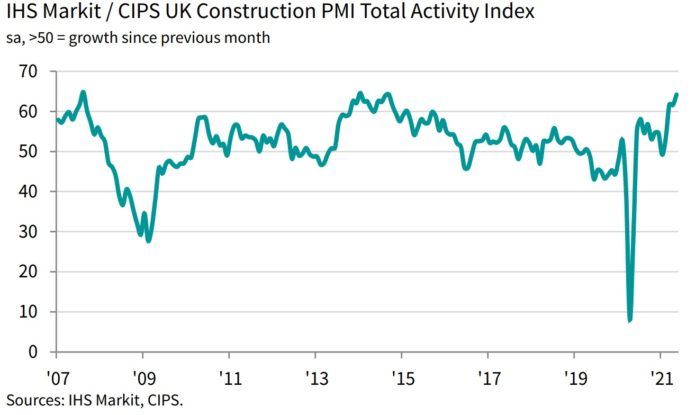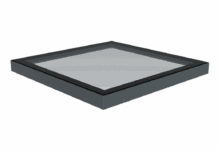May’s Purchasing Managers’ Indices (PMI) data from IHS Markit/CIPS has indicated that the UK construction sector remained on a strong recovery path in the month, with output growth reaching its strongest since September 2014.
At 64.2 in May, up from 61.6 in April, the seasonally adjusted IHS Markit/CIPS UK Construction PMI Total Activity Index registered above the 50.0 no-change value for the fourth consecutive month, and signalled the strongest rate of output growth for just under seven years.
Moreover, new order volumes increased at the fastest pace since the survey began in April 1997.
Input cost inflation was also at a survey-record high during May, reflecting a surge in demand for construction materials and severe supply shortages.
House building (index at 66.3) was the best-performing category of construction activity in May, followed by commercial work (64.4). The latest increase in work on commercial projects was the steepest since August 2007, reflecting strong demand conditions following the reopening of customer-facing areas of the UK economy.
Civil engineering activity (index at 61.3) also increased sharply during May, although the pace of expansion eased slightly since the previous month.
The latest survey pointed to a rapid upturn in new business across the construction sector. Around 47% of the survey panel reported higher volumes of new work, while only 11% signalled a reduction. Construction companies attributed the surge in order books to strong demand for residential building work and high levels of confidence about the near-term economic outlook.
New project starts and a sustained recovery in construction workloads resulted in another marked rise in staffing numbers during May. The rate of job creation was the fastest since July 2014, with sub-contractor usage increasing at a survey-record pace.
Mirroring the trend for order books, the latest data has indicated a steep upturn in purchasing activity across the construction sector. Some firms also noted that input buying had been boosted by efforts to build inventories in response to supply shortages.
Suppliers’ delivery times lengthened sharply in May, with the downturn in vendor performance the second-steepest since the survey began (exceeded only by that seen in April 2020). Stretched supply chains and steep rises in raw material prices contributed to a rapid increase in average cost burdens. The overall rate of input price inflation was the highest in just over 24 years of data collection.
Construction companies remain highly upbeat about their growth prospects for the next 12 months. Around 61% of the survey panel predict a rise in business activity, while just 8% anticipate a decline. Positive sentiment was mostly attributed to resurgent customer demand, alongside optimism about the UK economic outlook following the successful vaccine roll out.
Tim Moore, economics director at IHS Markit, said: “UK construction companies reported another month of rapid output growth amid a surge in residential work and the fastest rise in commercial building since August 2007. Total new orders increased at the strongest rate since the survey began more than two decades ago, but supply chains once again struggled to keep pace with the rebound in demand.
“There were widespread reports citing shortages of construction materials and wait times from suppliers lengthened considerably in comparison to those seen during April. Imbalanced supply and demand led to survey record increases in both purchasing prices and rates charged by sub-contractors.
“Despite severe challenges with materials availability, construction firms remain highly upbeat about their near-term growth prospects. Nearly two-thirds of the survey panel forecast an increase in output during the year ahead, while only one-in-thirteen forecast a decline.”
Brian Berry, chief executive of the Federation of Master Builders (FMB), added: “Rising material prices are continuing to limit the ability of local builders to build back better from the pandemic. It’s incredibly worrying to hear that the overall rate of input price inflation was the highest on record.
“This is consistent with the FMB State of Trade data that shows 93% of builders reported material price increases in Q1 of this year. Against the backdrop of high levels of inquiries for building work, it’s imperative that smaller businesses have the same access to materials as the larger firms during these difficult times.”




